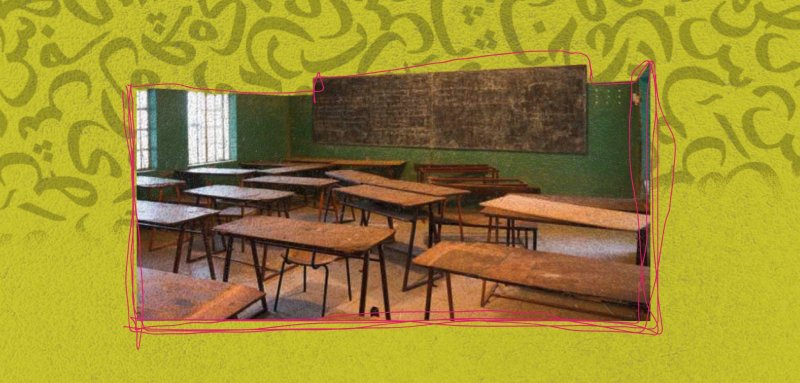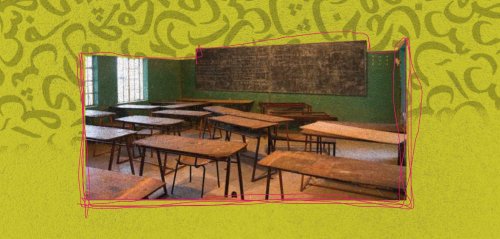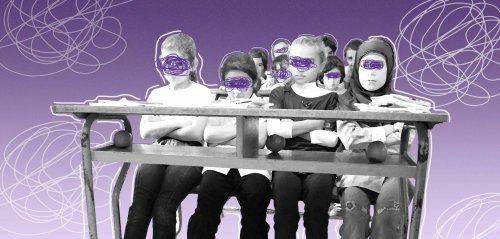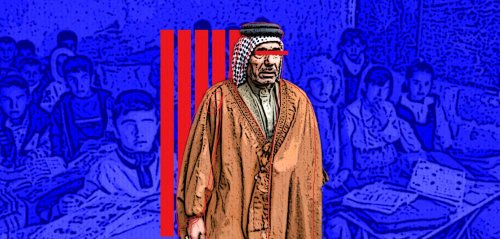Ibtisam Jawad, 45, tells Raseef22 of her struggles with the education of her three children in one of Beirut's public schools, following a four-year-long interruption as a result of COVID-19 and the recurrent strikes in the education sector. The main problem facing Ibtisam lies in her youngest son's level. During the general lockdown period, online education wasn't effective at all. She says that her son, Jad, who is six years old and in the 1st grade, "memorizes reading lessons in both the English and Arabic languages, because he is unable to distinguish between the letters of the alphabet."
Her daughter Aya's situation is not much different from Jad's, especially since she is in the 9th grade and has official exams this year. Ibtisam complains about the approaching date of the official exams, as her daughter has only been able to learn one and a half lessons in mathematics, since her teacher is still on strike despite the fact that the school opened its doors two weeks ago. She speaks of her daughter's educational level, saying, "She used to get exempted from her final exams due to excelling in her studies, and now I can't even afford to transfer her and her brother to a private school."
Strikes are haunting the current school year. The total number of school days that Lebanese children have had in the current school year has just been 45 days so far
Poor levels
Four years have passed, and the children of public schools in Lebanon are still in the unknown. After two years of the Covid pandemic and "formal" remote learning, as a result of poor internet and absence of even the minimum available equipment, strikes haunt the current school year. The total number of school days that Lebanese children have had in the current school year – up to mid-March – has just been 45 days, which means that it is impossible to make up for what was missed, making this year join the past few years in this "mockery" of an education.
Focusing on public schools and the primary education stage does not mean that the situation in Lebanese high schools and universities is better. The strikes in schools are the same as those in secondary schools, but the real catastrophe lies in depriving children of an academic foundation, especially in the kindergarten and primary school stages. Children in elementary grades do not know how to write their names yet, and do not have the minimum level of reading skills, and it has reached a level that children cannot even use pens correctly.
The teachers of public schools and high schools went on strike from December 2022, until the beginning of March this year, with some teachers refusing to return and committing to their strike. The rapid depreciation of their salaries as the dollar exchange rate soared, approaching the 100,000 LBP threshold, pushed the teachers to announce the strike, while the Ministry of Education and the government ignored their demands.
Parents who spoke to Raseef22 pointed out that studying at many public schools is now limited to a maximum of three hours, "The children spend most of their school day on the playgrounds, not in the classrooms"
Ra'eda Noureddine, 50, a mother of an eighth-grade student, describes the situation in Lebanon as catastrophic. She says she had decided to let her daughter lose an academic year in the first year of school suspension to maintain her level before finding herself facing four years of suspension. "The problem with my daughter lies mainly in mathematics, and I am planning on enrolling her in a private school next year, even if I need to ask for help from my relatives."
International expert on child protection Zeina Allouche stresses to Raseef22 the long-term effects of the current reality on the best interests of children. She points out that "the absence of children from educational centers has negative effects on the development of their skills, in addition to negative psychological effects." Lebanon will also witness a large gap between children in formal and public education and children whose circumstances allowed them to attend private schools.
"One step forward, two steps backwards"
Ra'eda, and many students' parents, hold the teachers part of the responsibility for the deteriorating educational situation in the past two years. Despite their belief in the legitimate demands and rights of the educators, students have become "hostages" to the repercussions of the issue on their educational future, according to them. The educators' reality represents a smaller version of the Lebanese reality, as their incomes are not enough to cover transportation fees and the minimum basic necessities of living.
"During the quarantine and lockdown period, online education wasn't effective at all. My son memorizes reading lessons in both the English and Arabic languages, because he is unable to distinguish between the letters of the alphabet"
According to statistics by "Information International", the number of teachers in private and public schools decreased from 2019 to 2022 by 12,502, or 12.4%. Many of those who were not fortunate to be able to immigrate sought new jobs with better financial returns than education.
Dania Shahin, a 44-year-old Arabic language teacher who has been in primary education for 14 years, talks about her constant struggle with her students as a result of their weak educational levels. She tells Raseef22, "Despite the meager income we receive, as soon as we enter the classroom, we must forget everything outside and focus on the interests of children who have lost a lot in the past years." She describes the period of remote education as catastrophic, as parents tended to do the homework for their children, and very few had the time to take care of their children's studies.
"Dania and all the contracted teachers will not receive any compensation for the three months of strike they spent at home since last December. In addition to the cost-of-living disasters, there are transportation costs. Dania says, "I live in Beirut and my school is in Aramoun. I need 500,000 LBP for transportation every day, and the amount doubles if I decide to go in my own car. This is all in exchange for only 100,000 LBP per hour, and we do not trust the promises made by the Ministry of Education."
Union negligence and the absence of the ministry
Despite the "formal" return to education in the past two weeks, many teachers have not complied with the decision, especially those living in remote areas. This is what Ra'eda and other mothers who spoke to Raseef22 pointed out, complaining that studying and education is limited to a maximum of three hours, "The children spend most of their school day on the playgrounds, not in the classrooms."
Lebanese political parties took the place of unions, the Ministry of Education, and the Lebanese government, and each party decided to entice teachers with some incentives and some liters of gasoline to encourage them to return. In the Bekaa Governorate and other areas under Hezbollah's influence, officials offered principals to urge teachers to return by providing them with 5 liters of gasoline for each day of teaching, as a transportation allowance. The country's educational file also took priority in the Lebanese situation, as the Secretary-General of the party, Hassan Nasrallah, repeatedly addressed the issue during his tv appearances last week.
Lebanese political parties took the place of unions, the Ministry of Education, and the Lebanese government, and each party decided to entice teachers with some incentives
"Today we are facing educational federations, not an education reality that cares about the interests of students," says the head of the active committee for contracted teachers in official public education, Nisreen Shahin, to Raseef22. She points out that teachers arrive in the classrooms "fed up with their situation", and the absence of educational plans increases the pressure on them. According to Shahin, the Minister of Education does not communicate with teachers and chooses to just, in addition to education associations, exercise all forms of pressure on teachers to force them to return.
She adds, "The unions have never presented any idea to improve the conditions of students in public schools, develop curricula, or hold those concerned accountable. In the ministry, work is not coordinated on the basis of placing the most suitable employee in the appropriate position, and the tasks overlap with each other." Raseef22 also learned that books and stationery have not yet reached some schools, despite the school year having started last September.
On the other hand, international advisor Zeina Allouche sees that Lebanon is facing a steady increase in child labor under the current circumstances. She describes the situation in Lebanon as a danger to the overall rights of children such as the right to education, health, and protection. Allouche adds, "If the funds of private education were invested in public education in a decent manner, we would have provided educational opportunities for all children and eliminated all privileges in the sector."
Raseef22 has repeatedly tried to contact the Ministry of Education to find out if they are working or seeking to work on any solutions, but to no avail. According to the secretary of the ministry's director general, Imad al-Achqar, the latter is "always busy in meetings," despite being informed about the subject of the report. In addition, George Daoud, head of the Primary Education Department at the ministry, put "the necessity of obtaining permission" as a barrier to conducting the interview.
"It is unacceptable for our children to not learn and for the children of others to learn," said the director general of the Ministry of Education, from the government palace in January, announcing the closure of schools in the afternoon for the non-Lebanese. In addition to the educational crisis that is depriving more than 300,000 students of education, marginalized groups such as refugees and the poorest families have become convinced that their children have no place in schools. The ministry, the government, and those in charge of this country have simply become partners in depriving children of their basic rights, instead of focusing efforts on their care, in the hopes that these children can rebuild what they have destroyed for decades.
Raseef22 is a not for profit entity. Our focus is on quality journalism. Every contribution to the NasRaseef membership goes directly towards journalism production. We stand independent, not accepting corporate sponsorships, sponsored content or political funding.
Support our mission to keep Raseef22 available to all readers by clicking here!
Interested in writing with us? Check our pitch process here!










Join the Conversation
Anonymous user -
1 day agoرائع و عظيم ..
جيسيكا ملو فالنتاين -
5 days agoزاوية الموضوع لطيفة وتستحق التفكير إلا أنك حجبت عن المرأة أدوارا مهمة تلعبها في العائلة والمجتمع...
Bosaina Sharba -
1 week agoحلو الAudio
شكرا لالكن
رومان حداد -
1 week agoالتحليل عميق، رغم بساطته، شفاف كروح وممتلء كعقل، سأشاهد الفيلم ولكن ما أخشاه أن يكون التحليل أعمق...
Anonymous user -
2 weeks agoهذا ليس طبيعيا، وهو ينشئ في الحالات القصوى من اضطرابات ومشاكل نفسية. الإنسان العاقل عندما يواجه...
Anonymous user -
2 weeks agoAnyone that studies human psychology and biological functioning of the body and it's interactions...